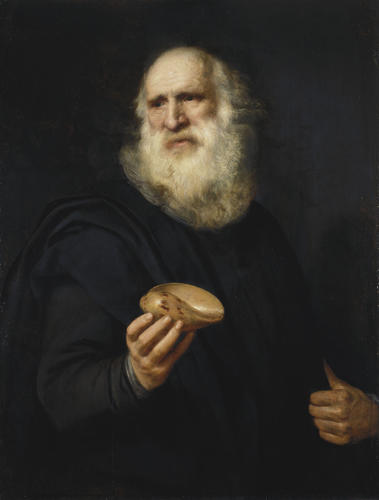-
1 of 253523 objects
A Bearded Old Man with a Shell c.1606
Oil on panel | 87.6 x 67.3 cm (support, canvas/panel/stretcher external) | RCIN 403956

Michiel Jansz van Miereveld (Delft 1567-1641)
A Bearded Old Man with a Shell c.1606
-
Michiel van Miereveld worked in Delft and was well-known for his portraiture – during his lifetime he is believed to have painted over a thousand portraits. He was much patronised by members of the House of Orange, as well as foreign ambassadors in the Netherlands, including the influential patron, Sir Dudley Carleton (1573–1632), who sourced paintings for Charles I and his court. This painting was one of four purchased by Sir Peter Lely from Charles I's collection at the Commonwealth Sale in in 1650 ('A Man wth a shell in his hand, done by Mich Jansen').The low price of £13 (compared, for example, to a painting of Moses attributed to Veronese that cost Lely £55) reflects the low standing in general of Dutch paintings in the seventeenth century.
The sitter here appears to be the same man (at the same age) as that in the portrait in the Walker Art Gallery, Liverpool, which is dated 1606 and signed Miereveld (though the signature is difficult to read). It has been suggested that both these paintings depict the artist's father, who was eighty years old in 1606.
In 1666 A bearded old Man with a Shell was hanging at Whitehall, in the passage between the Green Room and the Closet. At that time it was described as a self-portrait of Miereveld ('Michael Johnson Merevelt wth a shell in his hand'), and it hung there as part of a collection of 24 portraits of artists that included Rubens, Van Dyck, Artemisia Gentileschi (1593–1653) and Daniel Mytens (1590–1647). It was in the same location in 1688, still described as a self-portrait.
The old man carries an Indian volute shell, a type of sea snail that comes from the Indo-Pacific region. In the early seventeenth century such a shell would have been a precious and highly collectable item. Shells were collected in the seventeenth century and frequently appear as precious objects in still life paintings. The old man here seems to be showing us this fine specimen with the animation of a proud owner. Shells are also associated with mortality (another reason why they appear in still life paintings): the shell here might bear the same meaning as the skull often held in portraits especially of the elderly and God-fearing.
Text adapted from Charles II: Art and Power, London 2017.Provenance
In the collection of Henry, Prince of Wales, whose brand appears on the back. Inherited by Charles I; sold to Sir Peter Lely on 2 April 1650 and recovered at the Restoration by Charles II.
-
Medium and techniques
Oil on panel
Measurements
87.6 x 67.3 cm (support, canvas/panel/stretcher external)
115.3 x 95.3 x 11.0 cm (frame, external)
Category
Object type(s)
Other number(s)
Alternative title(s)
Old Man with a Shell
Cornelius Johnson (1593-1661), previously entitled
Thomas Johnson, previously entitled
Portrait of a Painter
Portrait of a collector